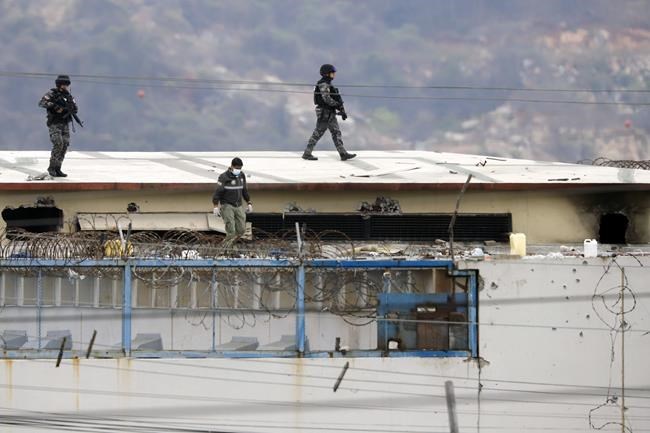QUITO, Ecuador (AP) — A prolonged gunbattle between rival gangs inside Ecuador’s largest prison killed at least 68 inmates and wounded 25 on Saturday, while authorities said it took most of the day to regain control at the Litoral Penitentiary, which recently saw the country’s worst prison bloodbath.
The killing erupted before dawn at the prison in the coastal city of Guayaquil in what officials said was the latest outbreak of fighting among prison gangs linked to international drug cartels. Videos circulating on social media showed bodies, some burned, lying on the ground inside the prison.
The shooting lasted around eight hours, officials said, and then new clashes were reported in part of the prison in the afternoon.
Presidential spokesman Carlos Jijón finally announced after nightfall that “the situation is controlled throughout the penitentiary.” He said about 900 police officers had taken control of the situation.
In the initial fighting, inmates “tried to dynamite a wall to get into Pavilion 2 to carry out a massacre. They also burned mattresses to try to to drown (their rivals) in smoke,” said the governor of Guayas province, Pablo Arosemena.
“We are fighting against drug trafficking,” Arosemena said. “It is very hard.”
The bloodshed came less than two months after fighting among gangs killed 119 people at the prison, which houses more than 8,000 inmates.
Police commander Gen. Tanya Varela said early in the day that drones flown over the chaos revealed that inmates in three pavilions were armed with guns and explosives. Authorities have said that weapons and ammunition are smuggled into prisoners through vehicles that deliver supplies and sometimes by drones.
The prison violence comes amid a national state of emergency decreed by President Guillermo Lasso in October that empowers security forces to fight drug trafficking and other crimes.
On Saturday, Lasso tweeted that “the first right that we should guarantee should be the right to life and liberty, which isn't possible if security forces can't act to protect.” He was referring the Constitutional Court's recent refusal to allow the military into prisons despite the state of emergency. Soldiers are currently outside the Litoral.
Ecuador’s penitentiaries are seeing a wave of brutal violence.
The bloody fighting inside Litoral prison that killed 119 inmates in late September was described by authorities as the South American country’s worst ever prison massacre. Officials said at least five of the dead were beheaded. Last February, 79 inmates were killed in simultaneous riots in various prisons. So far this year, more than 300 prisoners have died in clashes in penitentiaries across Ecuador.
Outside the prison, relatives of inmates gathered for news of their loved ones.
“Enough of this. When will they stop the killing? This is a prison not a slaughterhouse, they are human beings,” said Francisca Chancay, whose brother has been in the prison for eight months.
Some called for Ecuador’s military to take control of the prisons.
“What is Lasso waiting for? That there are more deaths?″ said Maritza Vera, whose son is an inmate. ”Have mercy, where are the human rights. We thought this was going to change, but it’s worse.”
Ecuador has about 40,000 inmates in its penitentiary system, which is far above the capacity of 30,000. Of this total, 15,000 have not been sentenced.
Arosemena said authorities in Ecuador will deal with the prison overcrowding by granting pardons, relocating inmates and transferring some foreign inmates back to their homelands.
“There will be more than 1,000 pardons, but this is part of a process," he said.
The Guayas governor also said Ecuador will receive international aid from countries like Colombia, the United States, Israel and Spain to deal with the crisis in its prisons. The aid will be in resources and logistics.
“For example, installing a freight scanner in the Guayaquil Penitentiary to avoid the entry of arms costs $4 million,” said Arosemena.
Vera said the situation is making the families of inmates desperate.
“I feel sad and in anguish because there is too much death,” Vera said.
Gonzalo Solano, The Associated Press


